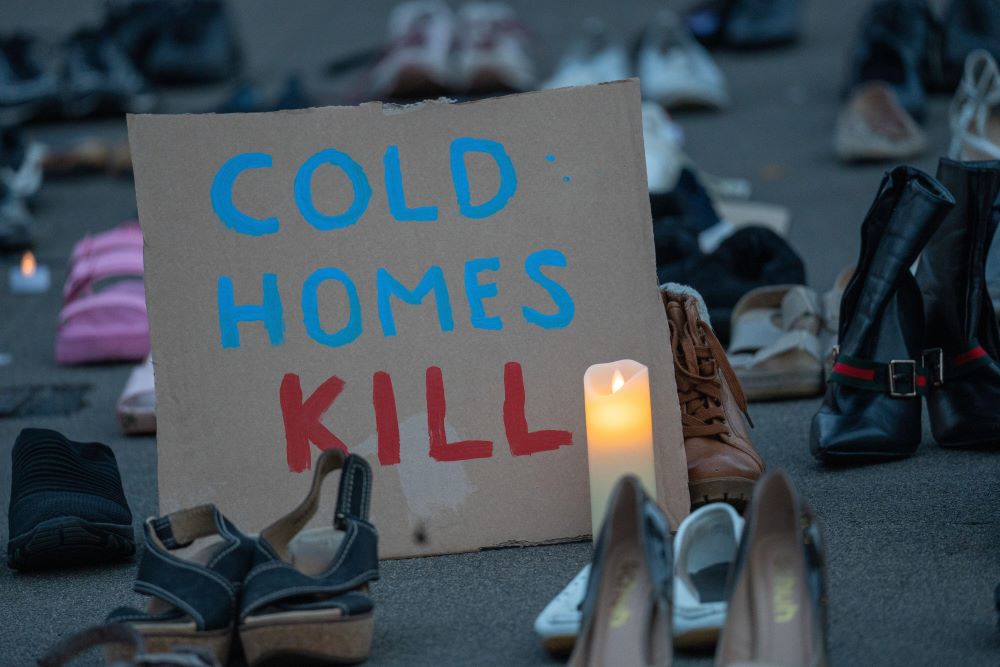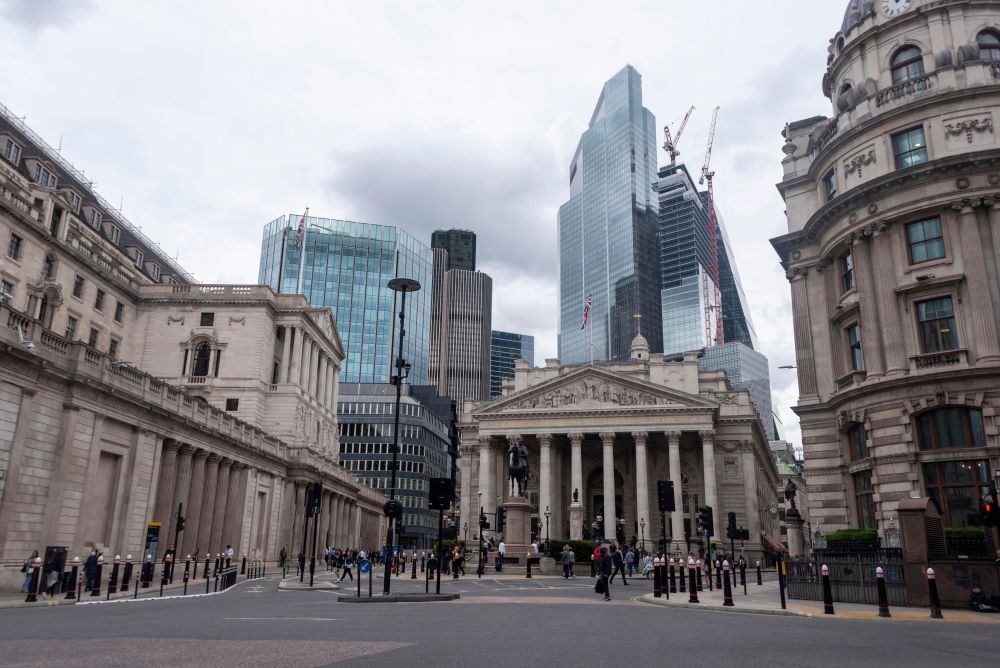Inflation, Energy Bills, Mortgages: Cost Of Living Challenges Facing Britain In 2024
Mortgages are set to rise in 2024 (Alamy)
8 min read
High interest rates, elevated energy bills, and above average inflation will see the cost of living crisis rumble on into 2024.
Polling shows the cost of living crisis remains a top priority for voters – with 77 per cent of voters reporting they believe the government is doing a "bad job" on the issue, according to recent polling by Ipsos.
James Smith, research director at the Resolution Foundation, told PoliticsHome the three core areas households would see pressure from in 2024 was inflation, interest rates, and energy bills.
Inflation remains higher than the Bank of England's target
Rishi Sunak made it his priority to half inflation by the end of 2023 after becoming Prime Minister the previous year. Inflation did fall to 3.9 per cent in the 12 months to November 2023 from a peak of a 41 year high of 11.1 per cent in October 2022 following Russia's invasion of Ukraine.
However, Smith warned that inflation falling did not mean prices were falling, too – rather that price increases has slowed down – leaving many household still struggling with high costs.
"The government have, rightly or wrongly, declared victory on inflation – but inflation is still more than... the Bank of England's targets," Smith explained.
"We're still in a position where the prices are much, much higher than they were prior to the cost of living crisis."
 111.jpg) Despite inflation falling the price of essentials has continues to rise. (Alamy)
Despite inflation falling the price of essentials has continues to rise. (Alamy)
Emma Revie, chief executive of food bank charity the Trussell Trust, told PoliticsHome inflation remains a serious issue for clients using the organisation's services.
"Even though inflation is dropping, inflation is still at such a high level, particularly on essential items like food – and where your budget is spent almost entirely on things that are being affected most by inflation," said Revie.
"This idea that we're past that problem is not something that, if you're on a low income, you experience. I'm very worried that potentially we're going into a year where it'll be even worse, but with less attention on this as as a core issue."
Food inflation in the 12 months to October was 9.2 per cent according to the Office for National Statistics (ONS), significantly higher than consumer price index (CPI) inflation in the same 12 month period.
A Resolution Foundation report released in December found 22 per cent of people were in moderate or severe food insecurity in October 2023, nearly three times higher than pre-pandemic levels when the figure was 8 per cent.
A Labour source told PoliticsHome the party believed inflation remained a priority for the party and for voters going into 2024, and that prices still remained too high.
"Our research and focus groups show that the cost of living crisis is still the number one issue for voters," they said.
"One of the things that was most striking from the autumn statement in the OBRs report was the fact that inflation is forecast to be higher and longer than previously estimated.
"That's one of the reasons why the main, big main argument [shadow chancellor] Rachel [Reeves] is making at the moment is asking people that question: Do you feel better off now than you did 30 years ago?"
Energy bills are set to remain high
Inflation is not the only thing that is keeping the cost of essentials up, with energy bills projected to stay high for months.
The price of energy hit record levels in early 2022 following Vladimir Putin's invasion of Ukraine, with Ofgem's energy price cap hitting £4,279 in January 2023.
The government capped the average household energy bill at £2,000 through its Energy Price Guarantee (EPG) to insulate households from rising costs – coupled a universal £400 energy bill rebate, and cost of living payments for people claiming certain benefits.
But while the price cap has now fallen steeply since its peak in January 2023, it is still projected to be £1,928 in January 2024 – significantly higher than before the energy crisis in October 2021, when Ofgem's price cap was £1,277. Households will not be provided with similar financial support they were last year to grapple with rising bills.
"With the withdrawal of government support, what we're basically seeing is prices of energy still higher this winter than they were last winter," Smith said.
 A Fuel Poverty Action vigil in Glasgow to remember those who have died as a consequence of not having the money to pay rising fuel bills. (Alamy)
A Fuel Poverty Action vigil in Glasgow to remember those who have died as a consequence of not having the money to pay rising fuel bills. (Alamy)
"The political focus is not on that, but for many families this winter will be as difficult – if not more difficult – given that higher level of inflation than it was even during the difficult winter we had last time. The cost of living crisis certainly isn't over."
Being able to afford energy bills remains a key concern to the public, with exclusive polling for PoliticsHome by Savanta in November finding that 32 per cent of respondents were "very concerned" about not being able to afford the energy bills, with 44 per cent reporting they were "somewhat concerned".
Simon Francis, co-ordinator at the End Fuel Poverty Coalition, told PoliticsHome the organisation was "not feeling great" about prospects for 2024 – with National Energy Action (NEA) estimating around 6.3m households live in fuel poverty in the UK already.
"Energy bills are going go up on the first of January for everyone," said Francis.
"We don't see any forecasts from the market, and from the analysts, that suggests that they're going to come down significantly at any point in 2024.
"This is why we find it difficult to understand why the government has failed to provide any additional support for households this winter, and doesn't have a plan in place to kind of then also support households next winter.
"Every single year this goes on, people's ability to pay those high prices reduces because the actual headline rate of inflation might be coming down, but those, it's not going backwards.
"So those high prices for food, transport, clothing and everything else that people need, are still going to be there. And they're still going to be going up."
Chair of the energy security and net zero committee, MP Angus MacNeil, told PoliticsHome there needs to be a greater effort towards a social tariff as well as making the energy market less of a "captive audience" – warning prices are set to remain elevated for the foreseeable future.
"There's a lack of movement in the energy market, customers are stuck with the one provider, and companies are farming the yields from their stuck customers," said MacNeil.
"They know customers can't go anywhere and there's a captive market.
"I've suggested to Ofgem that they look at ways of enabling people to be enticed to move because that would at least start making companies realise they don't have a captive market. People would stay with you if you weren't still milking the customer base.
"Something's got to be done, because the economic system has failed a lot of people in the UK. And if you can't afford food and energy there is no bigger failure than that."
Homeowners coming off fixed term mortgages face huge payment hikes
Smith said that 2024 would be a tough year for many at the end of their fixed term deals when homeowners are likely to face significantly higher interest rates.
The Bank of England (BoE) has announced it would keep interest rates at 5.25 per cent after the last 18 months saw interest rates increase rapidly as the BoE attempted to put a lid on inflation.
The steep increase in interest rates followed over a decade of interest rates remaining below one per cent, meaning households coming off fixed term deals next year face sharp increases in monthly repayments.
Labour has warned in December 2023 alone 170,000 homeowners were hit by higher mortgages as their fixed term deals come to an end – typically having to pay £240 more a month in repayments.
"We now have the majority of mortgages that are on fixed term for a period – so you have lots of households shielded from increasing increasing mortgage rates, so for some lucky households they'll have fixed their rates in 2021 – they'll have got a five year fix, they won't be facing higher interest rates," said Smith.
 The Bank of England's interest kept interest rates at 5.25 per cent in December. (Alamy)
The Bank of England's interest kept interest rates at 5.25 per cent in December. (Alamy)
"There's rough justice here in terms of the timing of homeowners fixed mortgages coming up. I think this will be really important coming into an election year."
Shadow economic seceretary to the Treasury Tulip Siddiq told PoliticsHome the many homeowners facing increased mortgage costs will experience "continued financial stress" in 2024.
"While the Conservative government seem to think that the cost of living crisis is over, the reality for households struggling to make ends meet is continued financial stress and uncertainty into 2024 as their fixed rate mortgage deals expire," said Siddiq.
A tough economic backdrop in an election year
Smith said inflation, interest rates, and mortgages makes the overall economic picture a difficult one for the government heading into an election year – warning it is "the worst parliament for living standards that we've seen".
"We've got really big increases in mortgages, very high prices – around all that, public services are in crisis, hospital waiting lists that are high," he said. "There's a combination of all those things basically makes it very difficult election."
A Labour source told PoliticsHome the party intended to highlight the difficult economic outlook in 2024 heading into the next election.
"Every month, we're having thousands of people who are getting a letter from their mortgage provider, saying you've got to renew – and that's extra money coming out of their pocket," they said.
"The challenge for the Conservatives is that this is a drip, drip, drip – erosion of their vote.
"People blame the government for that – it all hooks back to that "mini budget", and the fact that Conservatives crashed the economy."
